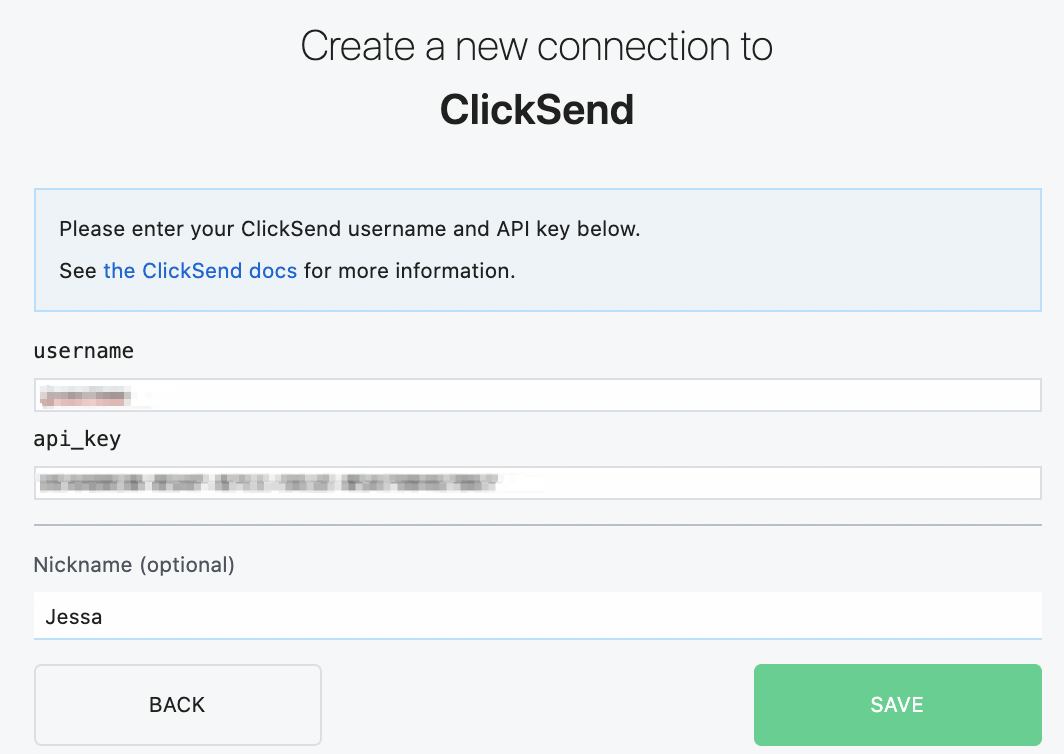What do you want to automate
with ClickSend SMS and Firebase Admin?
Prompt, edit and deploy AI agents that connect to ClickSend SMS, Firebase Admin and 3,000+ other apps in seconds.
Trusted by 1,000,000+ developers from startups to Fortune 500 companies
Popular Ways to Connect ClickSend SMS with Firebase Admin#
Popular ClickSend SMS and Firebase Admin Triggers#
Emit new event for each new incoming SMS message received. See the documentation
Emit new event when a new voice message is received or sent. See the documentation
Emit new event when a new child object is discovered within a specific path
Emit new event when a structured query returns new documents
Popular ClickSend SMS and Firebase Admin Actions#
Creates a new contact in a specific list. See the documentation
Creates or replaces a child object within your Firebase Realtime Database. See the docs here
Sends a new MMS to one or multiple recipients. See the documentation
Retrieves a document from a Firestore collection. See the documentation
Overview of ClickSend SMS#
The ClickSend SMS API unlocks the potential to integrate robust messaging capabilities into your workflows. With Pipedream, you can not only send SMS messages programmatically but also automate notifications, streamline communication based on events, and much more. Whether you're confirming orders, alerting staff, or engaging with customers, ClickSend and Pipedream make these tasks seamless.
Connect ClickSend SMS#
import { axios } from "@pipedream/platform"
export default defineComponent({
props: {
clicksend: {
type: "app",
app: "clicksend",
}
},
async run({steps, $}) {
return await axios($, {
url: `https://rest.clicksend.com/v3/account`,
auth: {
username: `${this.clicksend.$auth.username}`,
password: `${this.clicksend.$auth.api_key}`,
},
})
},
})
Overview of Firebase Admin#
The Firebase Admin SDK API provides powerful backend functionality for Firebase apps. It allows you to interact with Firebase services like Firestore, Firebase Realtime Database, Firebase Storage, and Firebase Authentication directly from a server. With Pipedream, you can harness this API to automate complex workflows, respond to Firebase events in real-time, and integrate with countless other services.
Connect Firebase Admin#
import admin from "firebase-admin"
export default defineComponent({
props: {
firebase_admin_sdk: {
type: "app",
app: "firebase_admin_sdk",
},
},
async run({ steps, $ }) {
// Enter values for the following parameters below this code step,
// These get passed to the initializeApp method below.
const {
projectId,
clientEmail,
privateKey,
region = "firebaseio.com",
} = this.firebase_admin_sdk.$auth
// Before passing the privateKey to the initializeApp constructor,
// we have to replace newline characters with literal newlines
const formattedPrivateKey = privateKey.replace(/\\n/g, "\n")
// See https://firebase.google.com/docs/reference/admin/node/admin.credential.html#cert
if (!admin.apps.length) {
admin.initializeApp({
credential: admin.credential.cert({
projectId,
clientEmail,
privateKey: formattedPrivateKey,
}),
databaseURL: `https://${projectId}-default-rtdb.${region}/`,
})
}
},
})Community Posts#

